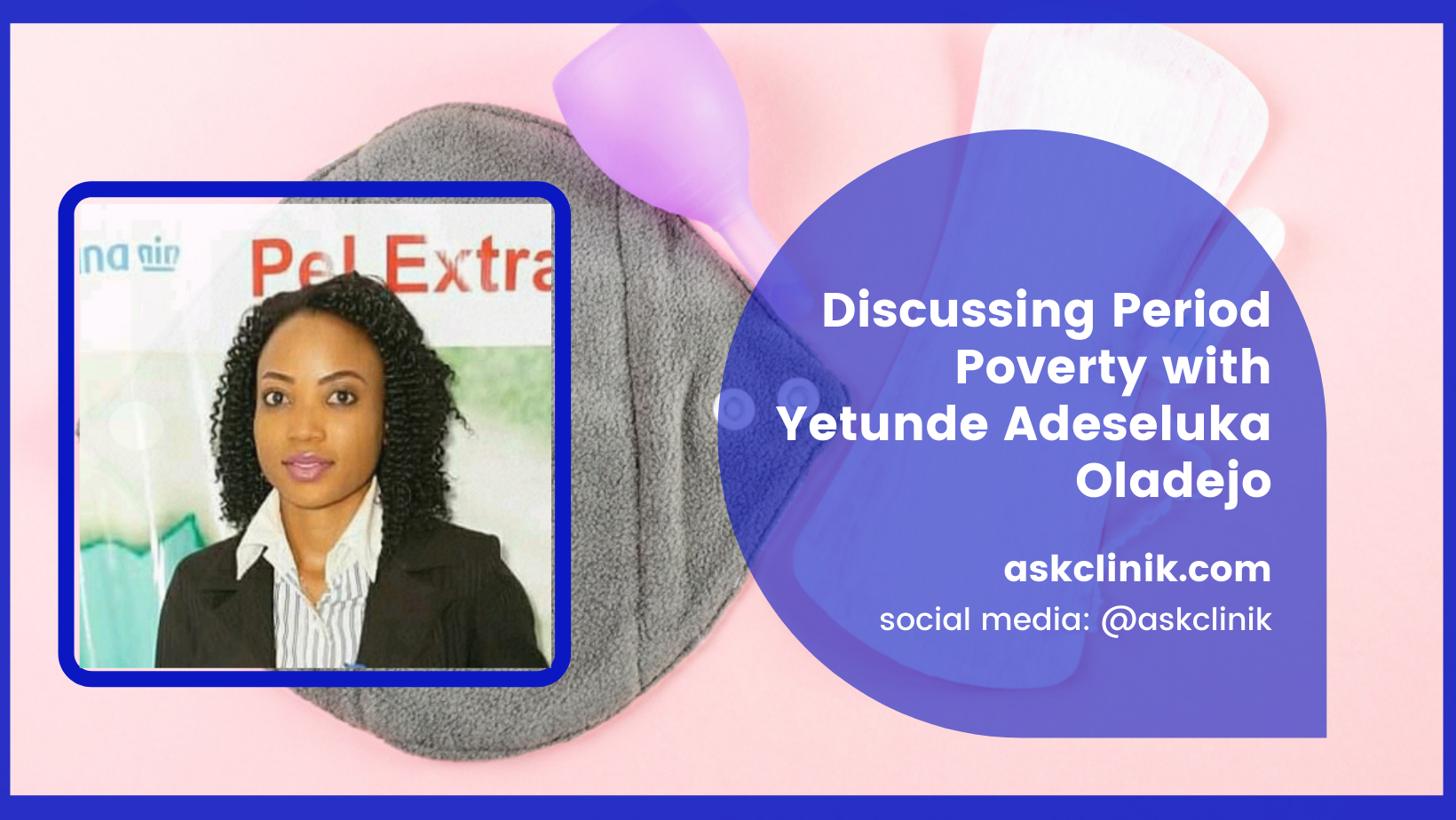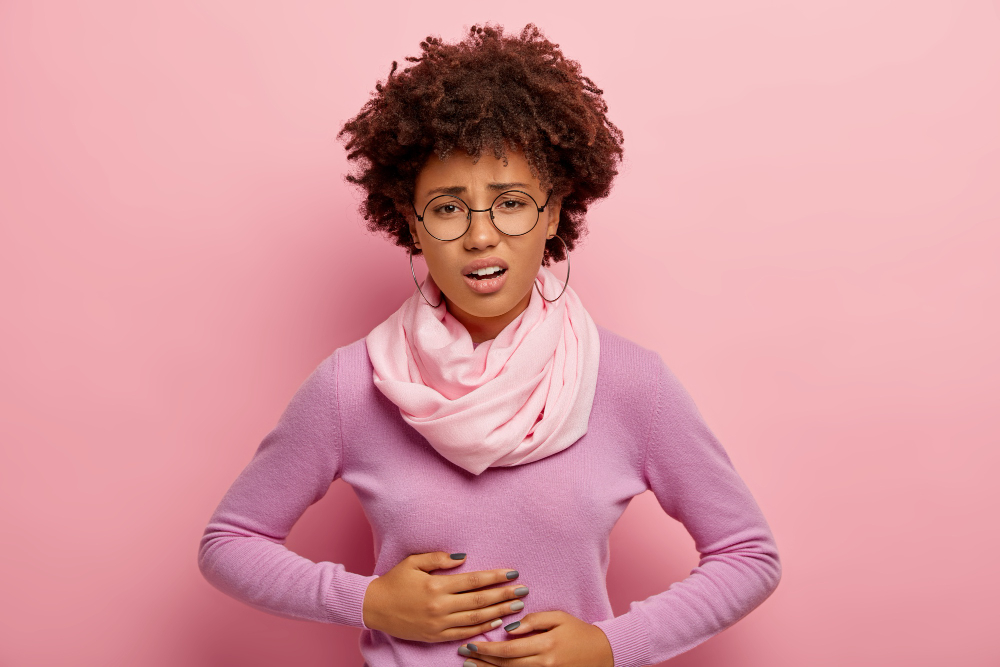Discussing Period Poverty- A Global Health Concern
Discussing Period Poverty- A Global Health Concern with Yetunde Adeseluka-Oladejo
Period poverty is a global issue affecting women especially a girl child. In the developing world, an average woman/girl child has at one point in their lives found it difficult to access sanitary products due to financial hardship. Girls who can’t afford safe sanitary products use rags, toilet papers, and newspapers during their menstrual period.
Hygienic sanitary products are an essential need and it’s every girl’s right to have access to it. According to UNICEF, poor menstrual hygiene can pose physical health risks and has been linked to reproductive and urinary tract infections. Access to hygienic low-cost menstrual products could reduce urogenital diseases.
Period poverty is a global issue that requires all hands to be on deck. We have private organizations, Non- governmental organizations (NGOs), and individuals educating women and girls on menstrual hygiene and also providing hygienic sanitary products to make period easier for them.
One of such individuals is Yetunde Adeseluka-Oladejo, a woman with the passion and determination to end period poverty in her community.
One of the askclinik teams interviewed her about her contribution towards ending period poverty and her role in public health;
Could you please tell our readers a brief background about yourself and how you started your professional line?
Yetunde Adeseluka- Oladejo holds a Bachelor of Technology in Medical Biochemistry from LAUTECH and a Master of Public Health Degree from the University of Ibadan, Nigeria. I am the convener of the Africa Health Savers Initiative (Girls’ Count Initiative), a 2020 YALI West Africa Fellow, a 2019 finalist of the Young African Leaders Award, The Gambia, Nelson Mandela Humanitarian Category.
You are active in core global health issues such as; public health, sexual and reproductive health, and nutrition. What motivated you?
Teenage girls, Women, and Orphans especially from low-income homes face a lot of challenges that pose limits to how, where, to what extent they can excel in life.
My motivation is founded in my resilience and passion to improve the livelihood, health, and well-being of Teenage girls, Women, Orphans, and underprivileged children in communities in Nigeria to give them opportunities to have a better and sustainable livelihood - Leaving No One Behind. I want to see a world where girls and women are empowered to be whatever they want to be.
What can you say is/are the challenges in your fields of work?
There are lots of challenges in my field of work. The fact that numerous public health issues are facing teenage girls, women, and orphans in my community; ranging from gender-based violence, poor menstrual hygiene, poor nutrition, little or no empowerment opportunities and poverty is a huge concern.
More so, access to funds to solve some or all of these issues is another major challenge.
Furthermore, cultural, religious and attitude of people in our communities towards public health issues are other main challenges faced in public health
Your Initiative “Girls Count Initiative”, sensitizes teenage girls about sexual and reproductive health, how do you approach them about this topic?
Many teenage girls have little or no information about sexual, reproductive health and menstruation. Many are cut unaware and are not prepared at the start of their first menstruation. Many do not even understand how their sexual and reproductive health works. They are ignorant of many of these cogent issues. At one of the Girls’ Count Project Implementation, one of the teenage girls said ‘Ma, the first time I started my menstruation, it was in school and I got stained, I didn't know until a boy told me and the boys laughed at me. I felt so embarrassed; my parents don't buy sanitary pads for me’. More so, the cost of disposable sanitary pads has made menstruation more difficult for teenage girls especially for those from low-income families whose main needs are food, clothing, and shelter. Many of these families make no provision for the menstrual hygiene of their teenage girls. In this century and time, many teenage girls still make use of unhygienic materials such as tissues, bed foams, rewashed disposable sanitary pads, clothes, etc. for their menstruation.
It is our social responsibility to protect our girls and give them every needed support to overcome any challenge that may stand on their path to success.
As an expert in public health; can you educate our audience on the sexually transmitted infection (STI) preventive tips?
The best preventive tip for all STIs is abstinence. However, in cases where abstinence is unachievable, it is important to take note of these life-saving STI preventive tips.
- Discuss honestly with potential partners about both of your sexual histories.
- It is important to get tested, along with your partner, before having sex.
- Always avoid sexual contact when under the influence of alcohol or drugs.
- It is very important to get vaccinated against the human papillomavirus (HPV), hepatitis A, and hepatitis B (HBV) and also consider pre-exposure prophylaxis (PrEP), a medication that an HIV negative person can take to reduce their risk of contracting HIV.
- Always use barrier methods (external or internal condoms for penetrative intercourse, including with sex toys, condoms or dental dams for oral sex, gloves for manual stimulation or penetration every time there is any form of sexual activity.
- Maintaining good hygiene is not only important to protect against infections but also can prevent STIs. Good hygiene such as washing hands before and after any sexual contact and urinating after sex to help prevent urinary tract infections (UTIs).
Your recent project was on “Ending Period Poverty”, and re-usable pads were distributed across secondary schools. How did you come up with the brilliant idea of re-usable pads knowing how expensive each one cost?
The idea came after implementing the first phase of the Girls’ Count Project in 2018 where 182 teenage girls received proper menstrual hygiene education, nutrition and health tips for coping with menstrual cramps, sexual and reproductive health education, and disposable sanitary pads. After the project, it dawns on me that this one-time provision of the sanitary pad will not solve the monthly unaffordability of sanitary pads faced by these girls. That was how I starting thinking about other ways to make sanitary pads available and affordable to these girls every month at no cost – this lead to the idea of providing them with hygienic, sustainable washable, reusable sanitary pads.
How can reusable pads be more accessible and less expensive?
First, we need to understand that menstruation is not a choice. Every girl and woman will experience this natural occurrence monthly for most of her life until she reaches menopause therefore it is imperative to make this process stress-free and offer maximum support throughout this period. Menstruation is very hard and very painful for many girls than most people think. The unaffordability of the expensive disposable sanitary pads has made this natural occurrence harder for many girls especially those from low-income households where there is often no budget for monthly disposable sanitary pads. Many skip school entirely during menstruation which should not be. If our government, private companies, and individuals can support bringing an end to period poverty facing our girls by budgeting some funds to support our teenage girls during menstruation, the reusable sanitary pads will be more accessible and less expensive.
How safe and reliable is the re-usable pad, considering hygiene?
The washable, reusable sanitary pads are reliable, hygienic, and safe. They have protective wings, super-thin with a high absorption rate, leakproof, breathable, and most importantly chemical-free. Furthermore, each pack of the sanitary pad has a storage bag for safekeeping of the pads after each month’s use.
Tell us about the most tasking project you have done?
All projects I have done have been tasking. However, provision of bicycles through funds sent by a US-based Philanthropist who read my post on the tremendous difficulty facing the students of Ore Akinde Village in Ado Odo Ota Local government in Ogun state who leave the village as early as 5:30 am to start to walk by foot on secluded road path for more than 3 hours to school and 3 hours back to the village from school in Iju town was tasking. Each stage of the project implementation was tasking- from traveling to and from the village on a bad, secluded road, procuring the bicycles, conveying them to the village for the children, and so on.
As an active contributor to period poverty, what can the Government do to end period poverty?
Even though biology and other subjects on the reproductive system are taught in our schools, it is imperative to further ensure teachers have a curriculum that speaks into details on menstruation, cares for the body during and after menstruation, and overall proper menstrual hygiene. The reproductive health of the female is sensitive and thus must be treated with utmost care.
Period poverty involves educating girls about reproductive health, menstrual hygiene, and providing hygienic sanitary products. Some homes can’t afford a balanced meal let alone providing sanitary products to their girl child. Scotland has become the first country in the world to put an end to period poverty by making sanitary products free.





Comments (0)